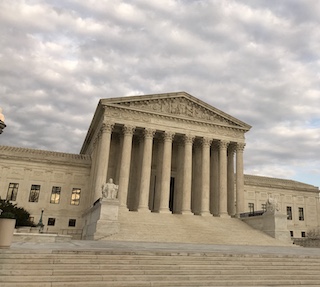On June 23, 2021, the U.S. Supreme Court issued its ruling in Lange v. California, a case arising in the First Appellate District in California, wherein a California Highway Patrol Officer entered the home of Walter Lange, after the officer tried to pull over Lange for playing loud music and honking his horn.
The Gist of this Article: The U.S. Supreme Court held that a police officer may not always pursue a misdemeanant suspect into his house – it depends on the facts and circumstances of the case whether such a pursuit qualifies as an exigent circumstance as an exception to the Fourth Amendment warrant requirement.
Lange drove less than 100 feet after the officer activated his overhead lights to make a traffic stop. However, Lange drove into his open garage and parked his car. The officer then followed Lange into the garage (attached to the home), apparently believing that Lange was evading arrest by trying to hide in his home.
After “catching” Lange and noticing signs of alcohol intoxication, the officer put him through field sobriety tests and arrested him for DUI. A later blood test determined Lange’s blood alcohol content (BAC) was three times the legal limit and he was charged with misdemeanor DUI.
Mr. Lange then moved to suppress the evidence obtained after the officer entered his garage, arguing that the warrantless entry into his home violated the Fourth Amendment.
The trial court denied Lange’s motion and the appellate division affirmed. The California Court of Appeal for the First District affirmed, concluding that Lange’s failure to pull over created probable cause to arrest Lange for the misdemeanor of evading arrest. The appellate court also stated that Lange could not defeat an arrest that began in a public place by retreating into his home. The pursuit of a suspected misdemeanant, the court held, is always permissible under the exigent circumstances exception to the warrant requirement.
The California Supreme Court denied review and Lange then filed a petition for a writ of certiorari to the U.S. Supreme Court.
 U.S. Supreme Court
U.S. Supreme Court
The U.S. Supreme Court then reversed the First Appellate District, holding that the pursuit of a fleeing misdemeanor suspect does not always categorically justify a warrantless entry into a home. Rather, whether such a search is a valid warrantless search will depend on the facts in a case-by-case assessment of exigency.
Justice Kagan wrote the majority opinion. She began her analysis by noting that the Fourth Amendment ordinarily requires that a law enforcement officer obtain a judicial warrant before entering a home without permission. Riley v. California (2014) 573 U.S. 373, 382 (best known for its holding that police cannot search a suspect’s cell phone during an arrest without a warrant without the suspect’s consent). However, she noted that a police officer may make such a warrantless entry when “the exigencies of the situation” create “a compelling need for office action and there is no time to secure a warrant.” Kentucky v. King (2011) 563 U.S. 452, 460; Missouri v. McNeely (2013) 569 U.S. 141, 149. Such exigencies may include acting to prevent immediate injury, the destruction of evidence or a suspect’s escape.
The U.S. Supreme Court was careful to distinguish Lange’s case from an earlier U.S. Supreme Court ruling in United States v. Santana (1976) 427 U.S. 38, a drug sales case, wherein the court upheld the warrantless search of a home of a felon that the police were in “hot pursuit” of when the suspect retreated into her house. In Lange, the court distinguished it from Santana, noting that Lange was a misdemeanor suspect, not a felony suspect, and that Santana did not create a “flat rule” permitting warrantless home entry whenever a police officer pursues a misdemeanant suspect.
Justice Kagan was careful to acknowledge that misdemeanors run the gamut of seriousness and they may be quite minor, involve no violence and present no immediate danger to public safety. She also acknowledged that when a minor offense (and no flight) is involved, police officers do not usually face the kind of emergency that can justify a warrantless home entry. See Welsh v. Wisconsin (1983) 466 U.S. 740, 742-743. However, add a suspect’s flight “and the calculus changes – but not enough to justify a categorical rule” that a warrantless entry into to a home in a misdemeanor is legal every time a suspect flees.
Instead, a case-by-case assessment is needed to evaluate the exigency arising from a misdemeanant’s flight. When the totality of the circumstances shows an emergency, police may act before getting a warrant if it is impossible to get a warrant under such facts.
As such, the Supreme Court remanded the case back to the trial court to perform an analysis of the particular facts of this case and whether such an exigency existed that the officer had to act quickly and had no time to get a warrant.
We appreciate the Supreme Court’s ruling in this case, as categorical rules can lead to mischievous application by police, so the Court’s hesitation to adopt such a rule for every case is smart and preserves the historically strong protection afforded a home from government intrusion.
The citation for the U.S. Supreme Court ruling discussed above is Lange v. California (2021) 594 U.S. ___.
For more information about warrantless searches in general, please click on the following articles:
 U.S. Supreme Court
U.S. Supreme Court